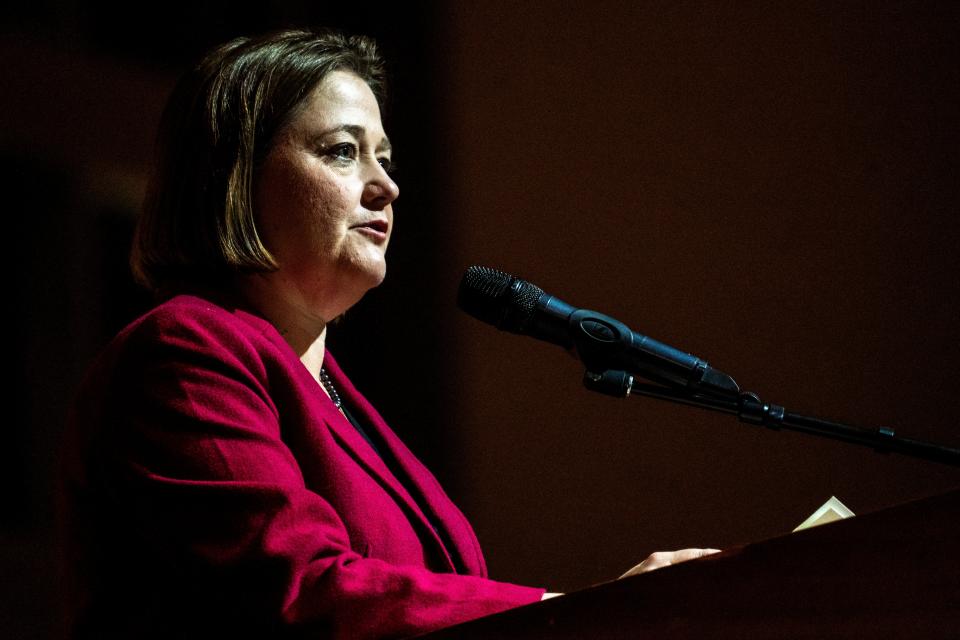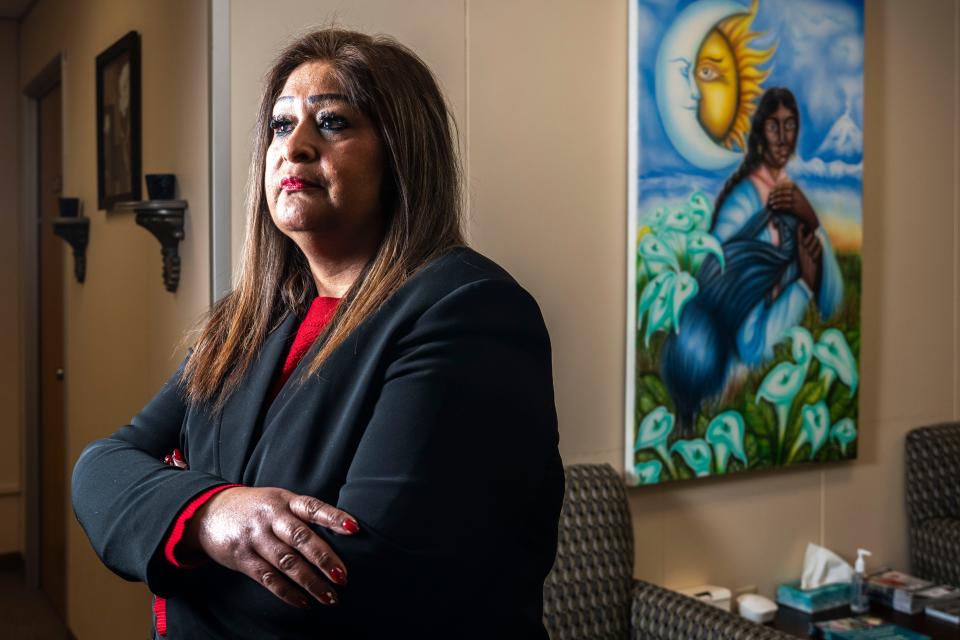More than 20,000 Iowa crime victims could lose services under looming federal funding cuts
Iowa agencies that provide support and services to victims of violent crimes say a proposed $5.4 million reduction in the state's federal funding under consideration in Congress could cut off help to more than 20,000 Iowans.
More than a dozen organizations across the state offer assistance to victims of domestic violence, sexual assault, human trafficking, homicide and other violent crimes. Their services range from helping victims find low-income housing to preparing for court appearances to assisting them in filling out applications for jobs or assistance programs.
To offer these direct services to clients, these nonprofit agencies rely heavily on a fund established under the federal Victims of Crime Act, or VOCA.
But Congress is currently considering a more than 40% cut to VOCA funds for the 2024 fiscal year budget, dropping the proposed allocation to $1.2 billion from the $1.9 billion budget the previous fiscal year, including a roughly $5 million loss for Iowa.
Iowa Attorney General Brenna Bird has signed a letter alongside 41 other state attorneys general calling on Congress to provide short-term bridge funding to VOCA, stating those agencies' services are critical to maintain.
“We must prevent victims from being victimized twice,” Bird said in a statement Wednesday. "… Victims have already been through enough. We’re calling on Congress to provide bridge funding to ensure victims and survivors receive the support they deserve.”

Without that funding, Iowa agencies would be forced to cut staffing and operations, meaning victims of crimes in Iowa would lose access to critical services, said Lindsay Pingel, director of community engagement at the Iowa Coalition Against Domestic Violence.
In fact, the coalition estimates that 22,386 crime victims could lose access to services without that federal funding.
“Every agency that's supposed to be providing various services to support survivors, we are all on incredibly tight budgets right now," Pingel said. "So trying to serve every survivor with everything they need is just getting harder and harder.”
Why is Congress considering a deep cut to VOCA?
The VOCA fund, which was established in 1984, collects fines or other financial penalties from those who have received federal convictions. Those dollars are then provided as grants to states to support victims of any and all violent crimes. The fund does not use any taxpayer dollars.
“It is the largest pot of money that most states receive to do this work," Pingel said.
Funding to VOCA has been dwindling in recent years, in part because of a change in federal prosecution strategies, according to the National Coalition Against Domestic Violence. In recent years, advocates say there's been an increase in deferred settlements and non-prosecution agreements in federal trials, meaning dollars from those settlements aren't deposited into the VOCA fund because they technically aren't criminal prosecutions, the national coalition says.
Congress did approve legislation in 2021 that provided a stopgap in funding, allowing VOCA to sustain itself for another few years. However, it was only a temporary fix, only providing enough funding to sustain the fund through the current fiscal year.
“We always knew it was a temporary fix and Congress has known it's a temporary fix," Pingel said.
The fund is not able to sustain itself at its current level, meaning the projected 2024 fiscal year is $700 million less than the current fiscal year, or a roughly 40% cut.
How does the VOCA funding cut affect agencies in Iowa?
The Iowa Coalition Against Domestic Violence and the Iowa Coalition Against Sexual Assault say 26 local agencies in Iowa would be impacted by a cut to VOCA grants. Last year, those agencies served nearly 56,000 Iowans who were victims of crimes.
These agencies received $13.1 million from VOCA last fiscal year, according to the Iowa Coalition Against Domestic Violence.
Bird and other states' attorneys general said in their letter to Congressional leadership that a cut to VOCA funding could result in a closure of crime victim service agencies nationwide, leaving victims without services and "endangering their safety and wellbeing."
The letter also points out that victims are often key witnesses in criminal proceedings against the offender, and that a lack of services for victims "may impact our states’ abilities to hold offenders accountable and thereby undermine public safety."
"Congressionally authorized bridge funding could provide stability to crime victims and victim service providers and avoid harm to public safety," the letter states.
Among those agencies in Iowa facing a potential impact is L.U.N.A. (Latinas Unidas Por Un Nuevo Amanecer), which specializes in helping Latin populations in Iowa. Staff at the statewide organization, which has offices in Des Moines and Marshalltown, often serve as translators or as a critical connection for Lanti victims to access low-income housing and other supports, said Melissa Cano Zelaya, the organization's executive director.
However, the organization's budget is stretched thin, and it's already been a challenge for the organization's seven staff members to meet all of the need they see across Iowa, Cano Zelaya. Without that funding, the organization would likely have to cut staff and reduce its operations.
"The question for policy makers becomes which victims do we stop serving and what services do we stop providing?" Cano Zelaya said.

Pingel said Iowans who would feel the most impact are those who already disproportionately struggle to access service. That includes those who live in rural communities, where there's support and other basic programming.
Why do advocates say an increase in state funding may not be enough to meet the need?
In light of these pending federal funding cuts, the Iowa Attorney General's Office has requested an additional $5.4 million from state lawmakers for crime victim services. However, Pingel said Bird's office has stated that request for additional allocation will only be made if VOCA funding to Iowa is reduced.
If approved, that $5.4 million would be in addition to the roughly $5 million that Iowa already provides every fiscal year to local crime victim service agencies, which is administered through the attorney general's office.

Pingel said this looming cut in federal funding comes as advocates have been calling on state lawmakers and other elected officials for increased state funding.
The Iowa Coalition Against Domestic Violence and the Iowa Coalition Against Sexual Assault have been calling on the Iowa Legislature to approve a total of $10 million in state funding for crime victim services.
However, Pingel said advocates' requests have not been answered and state funding for crime victim services has remained at $5 million for the past decade.
This has created its own challenges, particularly as demand for services from local agencies has continued to rise in recent years. Costs to provide these services have been on the rise, but federal and state funding sources have not kept up, Pingel said.
Pingel said her organization is continuing to call on state lawmakers to approve additional funding for crime victim service agencies, saying looming federal funding cuts has made it more critical than ever that they receive additional support.
“State and federal dollars have to work together in order to support survivors," she said.
Michaela Ramm covers health care for the Des Moines Register. She can be reached at mramm@registermedia.com, at (319) 339-7354 or on Twitter at @Michaela_Ramm
This article originally appeared on Des Moines Register: Iowa calls on Congress to prevent funding cuts for crime victims

